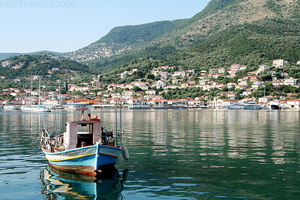I’ve been waiting until New Year’s Day to share a poem that captures the spirit of both Reschool Yourself and the first day of a new year. The poem, “Ithaka,” is filled with the adventure, self-reflection, and excitement of learning that I hope infuses 2009 for all of us.
One of my favorite Santa Clara University professors, Dr. John Heath, introduced me to “Ithaka” during my recent visit to his Survey of Classical Literature course. He read it on the final day of class, to send students off with a reminder of what’s important about college, and life beyond it. He told them that college is less about absorbing information than about gleaning lessons about the human experience. Ten years after graduating college, they wouldn’t remember the minutiae of their classes, but they ideally would have internalized what had enriched their understanding of themselves and their own personal journeys. “Don’t worry about the details,” he said. “See what it is to be your own hero.”
Before he handed out the poem, Heath introduced it in typical deadpan fashion by saying, “I’m sharing this with you against my will.” He went on to explain, “You know when you like a band, and you learn all their songs and go to their shows, and you’re one of just a few devoted fans? And then suddenly they take off, and everyone starts to like them? That’s how I feel about this poem–‘It’s my poem. You can’t like it, too.'” Apparently the poem, written by Greek poet C.P. Cavafy around the turn of the 20th century, had gained instant fame when it was read at Jackie O’s funeral in 1994. Heath was generous enough to share it with me and the rest of his class, and now I’d like to share it with you. Happy New Year!
Ithaka
By C.P. Cavafy
As you set out for Ithaka
hope the journey may be long,
full of adventure, full of discovery.
Laistrygonians, Cyclops,
angry Poseidon–don’t be afraid of them:
you’ll never find things like that on your way
as long as you keep your thoughts raised high,
as long as a rare excitement
stirs your spirit and your body.
Laistrygonians, Cyclops,
wild Poseidon–you won’t encounter them
unless you bring them along inside your soul,
unless your soul sets them up in front of you.
Hope the journey may be long.
May there be many a summer morning
when with what pleasure, what joy,
you enter harbors you’re seeing for the first time;
may you stop at Phoenician trading stations
to buy fine things,
mother of pearl and coral, amber and ebony,
sensual perfumes of every kind–
as many sensual perfumes as you can;
and may you visit many Egyptian cities
to learn, and go on learning, from their scholars.
Keep Ithaka always in your mind.
Arriving there is what you’re destined for.
But don’t hurry the journey at all.
Better if it lasts for years,
so you’re old by the time you reach the island,
wealthy with all you’ve gained on the way,
not expecting Ithaka to make you rich.
Ithaka gave you the marvelous journey.
Without her you wouldn’t have set out.
She has nothing left to give you now.
And if you find her poor, Ithaka won’t have fooled you.
Wise as you will have become, so full of experience,
you’ll have understood by then what these Ithakas mean.
